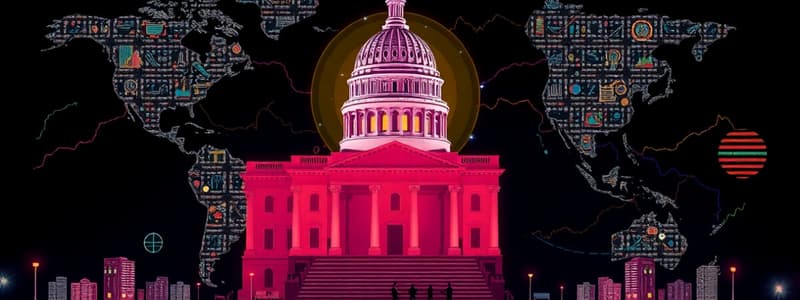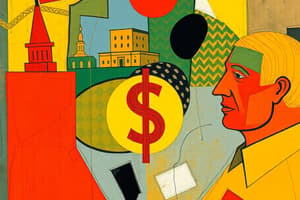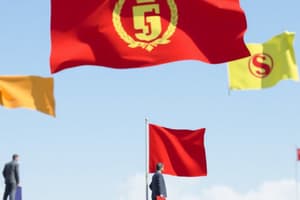Podcast
Questions and Answers
What is the primary focus of an economic system?
What is the primary focus of an economic system?
- Production, distribution, and consumption of goods and services (correct)
- Cultural practices
- Personal relationships
- Distribution of political power
Capitalism allows for significant government involvement in economic affairs.
Capitalism allows for significant government involvement in economic affairs.
False (B)
What are the two main ideologies upon which economic systems can be based?
What are the two main ideologies upon which economic systems can be based?
Individualism and collectivism
In an economic system based on __________, the government has a greater role in providing regulations and services.
In an economic system based on __________, the government has a greater role in providing regulations and services.
Which of the following economic systems is primarily based on collectivism?
Which of the following economic systems is primarily based on collectivism?
Match the economic systems with their characteristics:
Match the economic systems with their characteristics:
An economic system can be influenced by political systems.
An economic system can be influenced by political systems.
What role does the government play in a mixed economy?
What role does the government play in a mixed economy?
What is primarily funded by government spending?
What is primarily funded by government spending?
In traditional economies, wealth is often calculated in monetary terms like in industrialized societies.
In traditional economies, wealth is often calculated in monetary terms like in industrialized societies.
What are the three key principles of a collectivist ideology?
What are the three key principles of a collectivist ideology?
In a command economy, the means of production are owned by ________.
In a command economy, the means of production are owned by ________.
Match the following economic systems with their characteristics:
Match the following economic systems with their characteristics:
Which of the following is NOT a benefit associated with traditional economies?
Which of the following is NOT a benefit associated with traditional economies?
A totalitarian communist economy is referred to as a free-market economy.
A totalitarian communist economy is referred to as a free-market economy.
How many people are still using traditional economic systems worldwide according to the World Bank?
How many people are still using traditional economic systems worldwide according to the World Bank?
Flashcards
Economic System
Economic System
How a society organizes producing, distributing, and consuming goods/services.
Scarcity
Scarcity
Unlimited wants exceed limited resources.
Individualism
Individualism
Focus on individual rights and freedoms in resource management.
Collectivism
Collectivism
Signup and view all the flashcards
Capitalism
Capitalism
Signup and view all the flashcards
Communism
Communism
Signup and view all the flashcards
Economic Continuum
Economic Continuum
Signup and view all the flashcards
Role of Government (in Economics)
Role of Government (in Economics)
Signup and view all the flashcards
Government Spending
Government Spending
Signup and view all the flashcards
Traditional Economies
Traditional Economies
Signup and view all the flashcards
Command Economy
Command Economy
Signup and view all the flashcards
Wealth in Traditional Economies
Wealth in Traditional Economies
Signup and view all the flashcards
Collectivist Ideology
Collectivist Ideology
Signup and view all the flashcards
Means of Production
Means of Production
Signup and view all the flashcards
Subsistence economy
Subsistence economy
Signup and view all the flashcards
Economic Equality
Economic Equality
Signup and view all the flashcards
Study Notes
Economic Systems Defined
- An economic system organizes how a society produces, distributes, and consumes goods and services.
- It answers questions like: Who makes the goods? Who buys them? What are the rules for production and exchange? Who creates these rules?
- Economic systems are based on ideologies (ideas about how the world should be) shaped by beliefs and values, emphasizing either individualism or collectivism.
Types of Economic Systems
- Capitalism: Emphasizes individualism, individual rights, self-interest, private property, and a limited role for government.
- Communism: Emphasizes collectivism, economic equality, public property, and a strong government role.
- Mixed economies: Most economies blend aspects of capitalism and communism, falling somewhere on a left-right continuum.
Government's Role in the Economy
- Collective interest: A greater government role in regulations, higher taxes, and increased government services (e.g., healthcare, education, infrastructure).
- Individual rights: A smaller government role, less regulation, lower taxes, and fewer publicly funded services.
Traditional Economies
- Based on history, tradition, connection with the land, and communal interactions.
- Wealth is not primarily measured in monetary terms.
- Strong social networks and a defined division of labor are characteristics.
- Self-interest is tempered by communal needs.
- Still used by over 400 million people globally, despite pressures to convert to other systems.
- Often more sustainable, relying less on resource-intensive mass production.
Command (Centrally Planned) Economies
- This type of system is seen in totalitarian communist countries.
- Means of production (land, labor, capital) are owned by the government, not individuals.
- Wealth is distributed based on government decisions, aiming for economic equality.
Studying That Suits You
Use AI to generate personalized quizzes and flashcards to suit your learning preferences.



